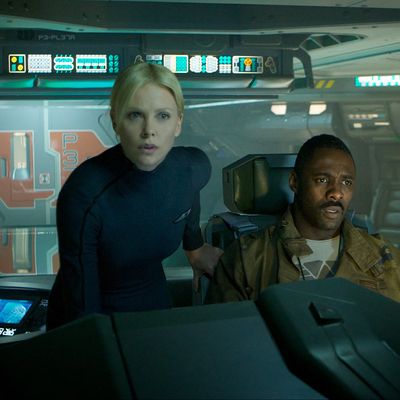
Ridley Scott’s Alien prequel, Prometheus, has practically none of the 1979 original’s visceral punch (for once I can use that adjective literally!), but also none of its dumb false scares or stupefying stretches in which characters on the verge of being skewered by a giant black monster with a glistening ovoid helmet-head search the bowels of a spaceship for a remarkably uninteresting cat. It’s a different sort of experience: a stately, somewhat plodding but endurable science-fiction saga that opens with the dawn of life on Earth and closes with mad carnage and a mystery even more troubling than how we humans got here. Along the way, I thought of 2001, The Thing (Hawks’ and Carpenter’s), and all those fifties sci-fi pictures that ended with “Keep watching the skies!” or a quivering “?” I thought of Lawrence of Arabia, mostly because the movie’s requisite robot-with-a-secret, David (Michael Fassbender), watches David Lean’s epic over and over and picks up Peter O’Toole’s pansexual wonderment as well as excellent posture. I thought of how nice it was to watch a Ridley Scott picture with no epic battle scenes for him to screw up. Scott might be the most overrated director alive, but he’s decent at slower tempos.
If you recall your first Alien encounter, you’ll be pleased to hear Prometheus offers an explanation for the enormous, vaguely humanoid skeleton at the controls of a spaceship on the moon where all but one of the crew of the Nostromo were gorily finished off. In the prequel’s prologue, a spaceship drops a bluish, well-muscled super-being off in a new world beside a mighty cataract, after which the fellow takes a pill and comes apart in ways that will be of interest to Darwinians, creationists, and alien-autopsy nuts alike. The rest of the film centers on a trip a few zillion years later (give or take) to the aforementioned anti-hospitable moon, where our heroine, Dr. Elizabeth Shaw (Noomi Rapace), and her partner/lover, Charlie Holloway (Logan Marshall-Green), hope to find the ancestors of aliens that left pictograms all over Earth along the lines of “Second star to the right and straight on till morning. BYOB.” A vast corporation has bankrolled the pair’s supposedly scientific expedition — but no corporation in an Alien movie has a non-nefarious agenda.
Director Scott has an agenda, too, starting with showing his female stars in their scanties à la the young Sigourney Weaver. Charlize Theron as the steely corporate rep Meredith Vickers begins her half-naked workout the moment she emerges from her sleep pod and then slips into a gray bodysuit that hugs her splendid form like an asp skin. Rapace’s character is wobblier out of the pod, which means she doesn’t get her big undies scene until much later, when she performs a bit of grisly self-surgery that should inspire the pro-choice movement for millennia to come. Misused in the last (lousy) Sherlock Holmes picture, the Swedish actress is a charming English-language heroine, not too hard, not too soft, just tremulous enough to make her ultimate resourcefulness a happy surprise — although the cross she has to wear to suggest her character’s stubborn doctrinal faith is more like a cross she has to bear. The males are less memorable. In the show-off robot role, Fassbender is amusingly fey, but nothing can make the does-he-or doesn’t-he-have-free-will question less hokey. Guy Pearce wears a few pounds of aging makeup as Weyland, the elderly head of the Weyland Corporation, suggesting that whatever the expedition finds will restore the mogul’s youth. (At the end of the movie, you might find yourself asking, Why not just cast an older actor?)
Prometheus has a few sensational effects, among them flying electronic “pups” that map out the vast alien cavern. The build-up to the first bloodbath (which is well over an hour in) is wittily prolonged. The climax is satisfying. But when all is said and done — most of the secrets revealed and chests busted — nothing has replaced the influence of artist H.R. Giger that suffused the 1979 original. Although it’s basically an ultra-fancy B scare picture with nothing on its mind except making you feel violated, Alien remains the key text in the “body horror” subgenre that flowered (or, depending on your viewpoint, festered) in the seventies, and Giger’s designs covered all possible avenues of anxiety. Men traveled through vulva-like openings, got forcibly impregnated, and died giving birth to rampaging gooey vaginas dentate — how’s that for future shock? This was truly what David Cronenberg would call “the new flesh,” a dissolution of the boundaries between man and machine, machine and alien, and man and alien, with a psychosexual invasiveness that has never, thank God, been equaled. Prometheus tells a much bigger story and does it well, but it’s missing what matters most. It’s inorganic.


